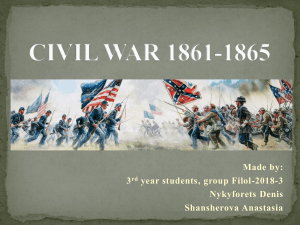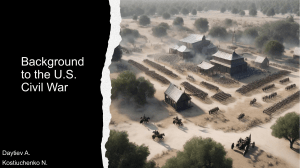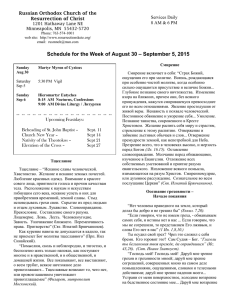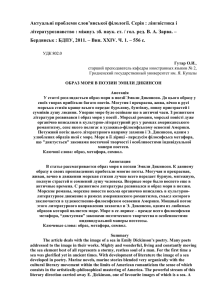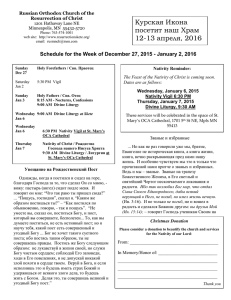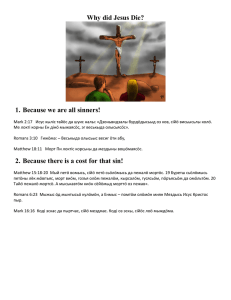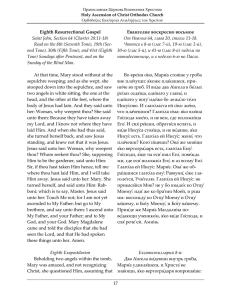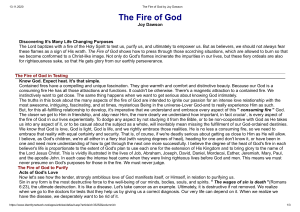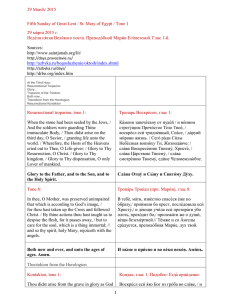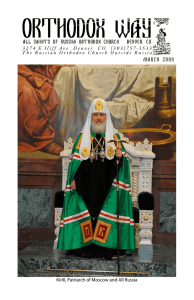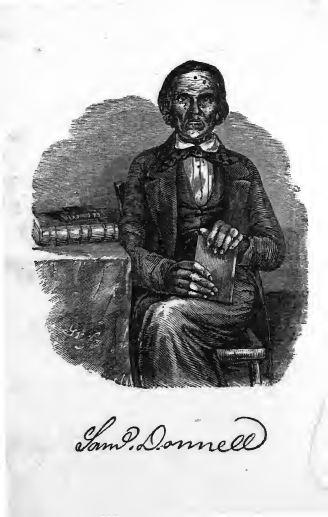
A SHORT MEMOIR OF SAMUEL DONNELL, Esq. ' ' By - I*s 0 JOHN RANKIN. •‘The righteous shill he in everlasting remembrance."—Psalm cxii: 6. CINCINNATI: AMERICAN REFORM TRACT AND BOOK SOCIETY. H. Hi' 64585 _■ A SHORT MEMOIR OF SAMUEL DONNELL, ESQ. BY JOHN RANKIN. " The righteous shall be m everlasting remembrance.” Psalm cxii: 6. Samuel Donnell, Esq., was born in Au¬ gusta county, Virginia, on the 23d of No¬ vember, 1769. He descended from Scotch ancestors, who were Presbyterians as far back as they are known, and firm adherents to the doctrines of the Reformation, as propagated by the great Scotch reformer, John Knox. In the year 1775, Mr. Donnell’s father emigra¬ ted from Virginia to Western Pennsylvania. He settled on the Conamaugh river, West¬ moreland county, and near the place where the salt works now are. Two years after his settlement at this place, the frontier settlers were forced by the Indians to recede from their new homes some twenty to thirty miles. 4 A SHORT MEMOIR OF In 1784, Mr. Donnell’s father, with some of his neighbors, built a boat, and passed down by water to the place where Maysville now is. At this time all was wilderness from Wheeling to Natchez. In passing all that distance by water, not a dwelling was to be seen, except a station at Louisville. In the interior of Kentucky there was Bryant’s sta¬ tion, and a station at Lexington. With re¬ spect to his father’s settlement in Kentucky, Mr. Donnell wrote the following facts: “Soon after we landed, other boats came from Pennsylvania. It was then concluded to settle a station on South Licking, three miles below the mouth of Stoner, where Isaac Piddle, with a colony of Dutch from North Carolina, had settled in the spring of 1780, and cleared and planted three hundred acres of com. In June of that year, Colonel Bird, from Detroit, with a party of French and Indians, took that station and Martin’s station, three miles above, about four hundred persons in all, and took them to Detroit. A station was settled on the North Branch of Licking, called after Colonel Hinkson, of one hundred persons, great and small. Some com was SAMUEL DONXELL, ESQ. 5 planted late. The provisions brought from Pennsylvania had to be left at Limestone, (now Maysville,) and could not be brought on immediately, were either wasted or used by those who came after we left that place. Consequently, from the last of May until new com came, we had no bread, and had to live entirely on buffalo, deer, and fish, all of which were abundant. When new corn came, a general sickness ensued, fever, ague and fever, so that of one hundred persons, all but two women were down at the same time. A few rods distant there was a spring, yet water could not be had to quench the intoler¬ able thirst, none being able to bring it. My father and mother were taken with what I now suppose was bilious fever, the rest with ague and fever, so that the whole family were down at the same time, no one able to help an¬ other. My mother, after extreme suffering for some weeks, died at sunset, and my father died about sunrise next morning. Both were buried in the same grave, on the north bank of Licking. From 1784 until 1790, we were continually harrassed by the Indians.” These statements show that Mr. Donnell, 6 A SHORT MEMOIR OE in the early part of his life, endured extreme hardships and most afflicting bereavements. His privileges were few, and his opportunities of mental improvement very limited. Under such circumstances, few would have made any advances in useful knowledge; but he pos¬ sessed a mind that gathered from all around, and expanded even in the midst of the great¬ est obstacles. With almost no means, he qualified himself for school teaching, and, greatly to the benefit of the newly settled country, he engaged in that useful employ¬ ment. He has left the following account of his parents and religious education, and his cir¬ cumstances in respect to religious privileges, temptations, restraints of conscience, serious impressions, and profession of religion: « My parents were members of Dr. Duffield’s church, Carlisle, Pennsylvania. They were married by him, and he baptized their two eldest children. There is still existing a certificate from his hand of their member¬ ship and dismissal when they left for Vir¬ ginia. In Virginia, they were members of Mr. Graham’s church, and in Westmoreland, SAMUEL DONNELL, ESQ. * 7 -Pennsylvania, they were members of Dr. Powers’ church. They were very careful in instructing their children. We had at that time no school books but the New England Primer. So soon as we could read the Shorter Catechism, we had, every Sabbath, to say our questions without failure. When I was a boy seven years old, I could answer every question correctly. Dr. Powers visited all his members twice a year, and catechized the children in the different neighborhoods. Now, when I am old, I believe I can answer correctly every question in the Shorter Cat* echism. And here let me say, I am more indebted for what little scriptural knowledge I have, to the New England Primer, than to all other books beside the Bible. So deeply was my mind impressed with the evil of sin, that my conscience would not suffer me to have any peace in violating the law of God. “The station of Hinkson, in Kentucky, at which I resided, was settled mostly by those who had been brought up under Pres¬ byterian influence. Among them there was not much open immorality, except what was occasioned by drinking. The boys about my 8 A 8H0ET MEMOIR OF age would gather together on the Sabbath to swim, and to engage in other sports. Sometimes I would go in the company, but could not join in the sports; I always felt guilty, believing that it was not keeping the Sabbath day holy. At last I took the plan of hiding myself at the time when I expected them to call on me to go with them. In this cowardly way I avoided temptation until they learned that I would not go with them to their Sabbath sporting. “We continued seven years at the station, during which time there was not one sermon delivered, nor was there any public religious exercises.” This appears to be a remarkable fact, that there should be one hundred persons at a station during seven years without any pub¬ lic religious exercises, and yet to consider¬ able extent maintaining a morality resulting from a religious education. It shows how difficult it is to throw off entirely the impres¬ sions given by early religious instruction. The case of Mr. Donnell is remarkable. Seven years without either any public in¬ struction or religious exercises, unconverted, SAMUEL DONNELL, ESQ. 9 and yet conscience, enlightened by early and pious education, restrained him from the open violation of the divine law, and caused him to hide himself from his wicked companions, in order to avoid temptation. This is a striking verification of the sacred proverb, “ Train up a child in the way he should go, and when he is old he will not depart from it.” The case of Mr. Donnell argues much in favor of the Shorter Catechism, and of early catechetical instruction. I will now return to his narrative. “ Mr. Rice had been on the south side of Kentucky river, and had organized a church at Harrodsburg, and another at Campcreek. Mr. Adam Rankin came from Nolachucky to Lexington in 1788, and organized a church. Soon after this, Mr. M’Clure came from Virginia, and organized Sinking Spring church, now Paris church, and also the church of Stoner Mouth. A log house was soon built, the people attended it with their guns, knives and tomahawks. After 1790 we were not troubled with Indians. liarmar’s army had gone out, and been defeated, and St. Clair’s, the next year, was also 10 A SHORT MEMOIR OF defeated. I greatly rejoiced to hear the gos¬ pel preached, although it was not preached in a very efficient way. “In 1791,1 commenced teaching a school, six miles distant from Sinking Spring church, and continued two years teaching at that place, during which time I regularly at¬ tended preaching. Although there was no awakening apparent among the people who attended church, yet I felt the burden of a sinful heart so pressing on me, that I was convinced that there must be some change, or I must be lost. My mind was turned to the declaration of the Saviour, John iii: 16, ‘God so loved the world, that he gave his only begotten Son, that whosoever believeth on him should not perish, but have ever¬ lasting life.’ While meditating on this pas¬ sage, I thought it was so glorious a display of unmerited love, that it ought to reach the heart of every sinner. In view of the love of God, I resolved to consecrate myself to his service, relying on the Saviour’s promise, ‘He that cometh to me I will in no wise cast out.’ Mr. William Henry was then an elder of the church of Sinking Spring, and, SAMUEL DONNELL) ESQ* 11 although he was a stranger, I took courage to open my mind to him, and he encouraged me to unite with the church. He had a son named James, an amiable young man, long since dead, and an amiable daughter named Sally, now the widow of Mr. James Thomp¬ son, deceased. These also being under religious impressions, united with me in applying for admission, and we were ad¬ mitted to membership, and were the first that were admitted on profession of faith, either in the church of Sinking Spring or of Stoner Mouth. “After making a profession, during two or three years my hopes and fears alternately prevailed. When my feelings were warm, my hopes were strong, but when this state of feeling subsided, I fell into a state of darkness, fearing that all was wrong, and that I had deceived myself. At length it pleased God to show me that my standing in his sight did not depend upon my feel¬ ings, or upon anything that I could do, but alone in the perfect righteousness of Christ. Since that time, I trust I have been enabled ‘ to walk by faith, and not by sight.’ ” 12 A SHORT MEMOIR OF On the 8th day of August, 1793, Mr. Donnell married Miss Hannah Quiet, by whom he had eight children. These he care¬ fully brought up and religiously educated. Few children have been favored with so ex¬ cellent a father. He was mild in temper, exceedingly firm in all right principles, and as meek as he was firm. He was strong in intellect, rich in useful knowledge, and per¬ severing in works of benevolence. His Christian example was ever worthy of imita¬ tion. Most, if not all of his children, have become members of the church, and are comfortably settled in the world. There is reason to hope that the power of his example will be felt by his offspring, and that they shall be known as the seed of the righteous, whom the Lord will bless. After his marriage, Mr. Donnell procured a farm on Taylor’s creek, Nicholas county, Kentucky, within the bounds of Concord church, which had been organized in 1792. In 1794, he was elected to the office of ruling elder in Concord church. The duties of this office he discharged with great acceptance to the members of that church, during his SAMUEL DONNELL, ESQ. 13 continuance in the State, a term of thirtyone years. He was in all respects a reformer, opposed to every form of sin. On the subject of peace he left the following statements: “By the grace of God I have lived in peace with all with whom I have associated, from boy¬ hood to the present time, 1850. I never had an angry controversy with any, either in church or civil courts, adopting fully the Apostle’s rule, to suffer loss rather than go to law. This, I think, has been of great advantage to me, rendering the path of life more pleasant to me than some others have found it to be. When I had to muster in early life, and looked around on the musterfield, I was led to inquire at my own heart: What are we here for ? What is all this ado for ? The answer could only be, to learn to kill your fellow men expertly, or to learn to kill yourself. Strange! has God placed men on earth to murder each other ? Surely this can not be his design. What has the Saviour said on this subject ? ‘ But I say unto you, love your enemies, do good to them that hate you and persecute you.’ ‘If thine enemy 14 A SHORT MEMOIR OB' hunger, feed him, if he thirst, give him drink.’ 4 See that ye be not overcome of evil, but overcome evil with good.5 4 Resist not evil, but contrarywise overcome evil with good.5 These are some of the teachings of the Prince of peace. From that time to the present I have used my mite of influence against the war spirit.55 Thus, from youth, up to the day of his death, he was a firm opposer of war. He most strikingly, during a long life, exemplified the peace principles. It is said that no one ever knew him 4o be angiy. Previous to the formation of the constitu¬ tion of Kentucky, the Rev. David Rice, a Presbyterian minister, made great efforts to have slavery abolished, by the adoption of a free constitution. He was a man of eminent piety and benevolence. His talents, his ven¬ erable age, his industry in every enterprise for the elevation of his fellow men, all con¬ spired to give him great power and influence in the State. And happy had it been for Kentucky had she yielded to his benevolent counsels. He was chosen a member of the convention to form a constitution. A short SAMUEL DONNELL, ESQ. 15 extract from his speech before the conven¬ tion will exhibit his benevolent feelings. “Mr. Chairman, I have lived free, and in many respects happy, for nearly sixty years; but my happiness has been greatly dimin¬ ished, for much of the time, by hearing a great part of the human species groaning under the galling yoke of bondage. In this time I lost a venerable father, a tender mother, two affectionate sisters, and a beloved first¬ born son; but all these together have not cost me half the anxiety that has been occa¬ sioned by this wretched situation of my iellow men, whom, without a blush, I call my brethren.” This is the breathing of a soul that can be happy only in the happiness of others. With respect to slavery, Mr. Donnell says, “I had not thought any on the subject of slavery, until I heard Mr. Rice. In 1792, when the first constitution of Kentucky was formed, I took an active part with Mr. Henry, and others, in getting up associations through the county, and passing resolutions instructing our delegates to make provision in the constitution for the emancipation of 16 A SHORT MEMOIR OF the slaves. In Bourbon county we elected the emancipation ticket by a large majority. Mr. Rice’s bill for emancipation was lost in the convention, by a majority of four votes, and that by the influence of George Nicholas and John Breckinridge, prominent lawyers. “In 1796, the constitution was revised: vigorous efforts were made in Bourbon county by both parties. The emancipation ticket fell by four or five votes. So completely had slavery gained the ascendency, that in the convention no efforts were made for liberty.” This is a melancholy part of the history of Kentucky. The dark fiend of slavery triumphed over that fair land, by the efforts of two wicked men. Better had it been for Kentucky, and better for themselves, if they did not repent, that they had never been bom. But for the efforts of these two men, Kentucky had now been free, and had been truly the “ garden of the world,” blooming as the paradise of the earth. Dark was the hour when this fairest of lands was finally given up to the blighting curse of slavery. We see in this lamented fact the extreme SAMUEL DONNELL, ESQ. 17 difficulty of staying the ravages of the dark and bloody system of slavery when it has once taken root in a territory or state. And it shows the necessity of protecting our terri¬ tories from this wicked and ever encroaching system of oppression, by positive law. Mr. Donnell never ceased to make efforts against slaveiy. He was ever active in forming abolition societies. I, (the writer of this memoir,) in the au¬ tumn of 1817, left Tennessee, my native State, on account of slavery, intending to settle in Ohio, because it was a free state. I was providentially stopped on my way, at Concord church, of which Mr. Donnell was an elder. This church then consisted of more than two hundred members, and in it there was but one r slaveholder, who pacified his anti-slavery brethren with promises that he would set his slaves free, which, however, he never performed. I served this church four years and some months as their minister. I found in this church an abolition society, maintaining the doctrine of immediate abo¬ lition, which the enemies of liberty now call modern abolitionism, and pretend that it 2 18 A SHORT MEMOIR OF never existed until the days of Garrison. The sentiment of the members of this society was, “ That if the slave has a right to free¬ dom at all, he has it now.” Some of the prominent members of this society were Samuel Donnell, Esq., William Henry, James Thompson, Esq., William Thompson, and John C. M’Coy. All of these were active and leading members of the abolition society. They advocated openly the abolition of slavery. They held public meetings of the society, discussed the evils, sinfulness, and cruelties of the slave system. They circulated tracts and books against slavery, so far as they had means, and entered and carried on suits in behalf of such slaves as were held contrary to law. William Thomp¬ son, during many years, was confined to his chamber by a severe rheumatism. He was a man of strong intellect, and spent much of his time in writing against slaveiy. William Henry, with whom Mr. Donnell first associated in the abolition cause, was one of the fairest characters known among men. Meekness and benevolence marked his path through life. He was “ an Israelite, SAMUEL DONNELL, ESQ. 19 indeed, in whom there is no guile.” He was always active in the cause of the oppressed. He not only labored for the abolition of sla¬ very, but also to impart to the benighted slave the light of life. He went in person to slaveholders, and obtained their consent to let their slaves attend a Sabbath school, in order to learn to read the Scriptures, and some of the same persons, after giving their consent, instigated the patrol to break up his school—the poor slaves were whipped in his presence, and dispersed, to meet in Sab¬ bath school no more. This venerable father has long since gone to the rest prepared for the people of God. His body lies silent in the burying-grounds at Sandcreek church, Decatur county, Indiana, and he is forgotten by all but those who love his character, and cherish the memory of his virtues. I could not pass on with my narrative without pay¬ ing a tribute of respect to one whose piety did- honor to every good cause in which he labored. At this period, before the days of coloni¬ zation, there were in the slave States many noble spirits, who stood up boldly for liberty 20 A SHORT MEMOIR OF and humanity. Many Christians then were opposed to the admission of slaveholders to communion. And had it not been for the authority of presbyteries and synods, slave¬ holders would have been excluded from a number of Presbyterian churches. Of these, Concord was one. The session ot this church did pass a resolution, requiring any member of it holding slaves to set them free. Such was the prevalence of anti-slavery sentiment in the region in which I labored, that no vio¬ lence was offered to the persons of those who openly propagated it. I preached against slavery in some of the most prominent places in the State, and was known as an aboli¬ tionist so far as I was known, and I spoke against slavery in the families of wealthy slaveholders, and I never had an insult offered. Mr. Donnell was one of the promi¬ nent men in producing this state of things. His meekness of temper, his patient firmness, his known integrity, and his strong and clear reasoning powers, all conspired to give him success, and to extend his influence. Not¬ withstanding his known and decided aboli¬ tionism, he was appointed a civil magistrate, SAMTTEL DONNELL, ESQ. 21 and was well qualified to fill that office. I suppose at a later period of life he could not have held office in a slave State. So long as he held this office, he exercised it, so far as practicable, on the side of liberty, and never against it. In various ways he was the means of pro¬ curing the liberation of a number of slaves. He was always watchful, and improved every opportunity of doing good. When he found a slaveholder about to die, he would go to his sick bed, and urge him to set his slaves free, and not venture, as a slaveholder, to enter into the eternal world. In some cases he succeeded, in this way, in securing the liberation of slaves. He, like Job, “was a, father to the poor,” “and the case that he knew not he searched out.” In respect to the use of ardent spirits, Mr. Donnell left the subsequent melancholy narration: “ Early in life I saw daily the evils result¬ ing from drinking. We could not attend a court, muster, or even a log-rolling, or a corn-husking, without seeing some drink, and engaging in all manner of folly and 22 A SHORT MEMOIR OF wickedness. The universal belief was, that ardent spirits were necessary and useful, especially to laboring men, and a great bless¬ ing, when properly used. However strangely, it may now appear, this, forty or fifty years ago, was nearly the universal opinion. Priest and people all drank intoxicating liquors. Mr. Findley, the most popular preacher in the State, was deposed for drunkenness, and some others ought to have been deposed, and would have been, if they had not promised amendment. What could be done for tem¬ perance in such a state of society ? In public gatherings all drank freely, and he was the best fellow who could drink most without being what they called drunk, that is, with¬ out falling down, and being unable to rise again. At this time, little difference would be seen between professors and non-professors. In Concord church there were about a dozen who would get drunk when at public gather¬ ings for secular purposes. When called before session, some would freely confess, and profess sorrow; others would deny to the latter end, and when the charge was clearly proved, it was said, ‘Well, if I was SAMUEL DONNELL, ESQ. 23 drunk, I did not intend it.’ Then the ques¬ tion was put to him, ‘ Do you profess sorrow for it, and promise that in future you will be more careful?’ The answer was, ‘Well, if I was really drunk, I am sorry for it.’ And then the conclusion was, ‘Well, we must restore the brother, he professes sorrow for his sin;’ but with all his sorrow, the same offence would be repeated on the next occa¬ sion that offered. This course was followed for years, without reforming one of them. I offered to session a resolution, that those, at least, who were given to drunkenness, should not be restored, unless they would give a pledge that they would abstain from drunkenness, and not use ardent spirits, except when necessary as medicine. This was opposed mainly as an attempt to abridge a man’s liberty. It was contended that a man "had a right to make and drink as much as he pleased, being accountable for the abuse of that liberty. The church had au¬ thority to deal with men for getting drunk, but none to restrain them from drinking,— that was every man’s right. This was for¬ merly the state of things in Kentucky. A 24 A SHOET MEMOIR OF great change has since taken place. May God carry on his work until the earth will have been redeemed from the curse of intem¬ perance.” In 1822, having resigned my pastoral charge of Concord church, I left for Bipley, Ohio, the place of my present residence. While I was pastor of that church, the last one of those intemperate persons, of whom Mr. Donnell speaks, was purged out, and afterwards came to a sudden death by falling backwards from the railing of his porch. When I left, the members of that church, with veiy few exceptions, were as orderly and pious as any equal number now to be found in any of the churches of the present day. In 1823, Mr. Donnell moved to Indiana, and settled on Sand creek, Decatur county, and a large part of the members of Concord church left Kentucky, and settled at the same place, and formed the church of Sand creek. In this church Mr. Donnell was chosen elder, and continued to discharge the duties of that office until 1844, when he was dis¬ qualified by deainess. In the process of time, the church of Sand SAMUEL DONNELL, ESQ. 25 creek divided on the subject of slavery. A pro-slavery and colonization party was formed in Sand creek church, by certain persons of some influence, and with this party the pastor threw his influence. None but the true-hearted and conscientious were able to stand against the influence exerted, and consequently the true anti-slavery party found themselves in the minority in a church that had left Kentucky on account of slavery, and had been founded by abolitionists. Such is erring human nature! The minority found their grievances too great to be en¬ dured. They seceded, and built a new house, and finally, after the division into old and new school, they united with the new school, hoping that this body would become an anti¬ slavery church, and exclude slaveholders from communion. In this they were dis¬ appointed. When Mr. Donnell heard that Eipley Presbytery had seceded from the synod of Cincinnati, he was greatly rejoiced at the prospect of the organization of an anti¬ slavery Presbyterian church. He said he hoped to get out of a slaveholding church 26 A SHORT MEMOIR OF before be should die. He had labored long and faithfully to have slavery purged out of the Presbyterian church, but without success. The last time he appeared in Sand creek was at the time it voted to change its con¬ nection from the new school body to the Free Presbyterian church of America. He was so animated with the prospect of getting out of a slaveholding church, that, although he was on the borders of the grave, he seemed to speak with all the vigor of youth. The vote was unanimous, and the desired transi¬ tion has been made. The church of Sand creek, and that of Clarksburg, a small church formed out of it, are now in con¬ nection with Felicity Presbyteiy, of the Free Synod of Cincinnati. When Mr. Donnell was on his death bed, his old and tried friend, John C. M’Coy, who had been with him in all his trials, came to see him. Mr. Donnell said to him, “Will you certainly carry into effect the vote of the church for union with the Free Presbyterian church ?” Mr. M’Coy said, “ I certainly will.” “ Then,” said Mr. Donnell, “ I am content, I can die in peace.” Every thing else had been previously settled. SAMUEL DONNELL, ESQ. 27 He lived to see the minority, that came out from the old school, become the stronger of the two, and to Bee her unanimously take the right position with respect to theFreechurch, and to see the church of Clarksburg organized, and in a good house. A short time before his death, he recorded the following protest: “ Now I leave my solemn protest against the crying, the God-dishonoring, and the soul-destroying sins of war, slavery, and in¬ temperance. May God hasten the day that he has promised, ‘ when wars shall cease to the end of the earth ; when the nations shall learn war no more, and when they shall beat their swords into ploughshares, and their spears into pruning-hooks; nations shall not lift up swop! against nation;’ and when every man shall sit under his own vine and fig-tree, and none shall hurt or destroy in all God’s mountain.’ ” The following statement will show that after all the efforts Mr. Donnell had made for the glory of God and reformation, and consequent happiness of his fellow men, that he still had a low estimate of himself, and of all he had done in the cause of Christ: 4 28 A SHOET MEMOIR OF “I am now nearly eighty-one years old, In a very low state of health; my physical system is worn out. I realize that I will ■very shortly be called to the bar ot Jesus Christ, to give an account of the deeds done in the body, whether good or bad. After professing, for sixty years, to love and serve the Lord, I feel myself as poor, as helpless, and unworthy as I ever did at any former time. I can truly say, ‘I count all my right¬ eousness as filthy rags.’ I leave all that I have ever done and suffered in the service of God out of sight, relying alone on what, I hope, Christ has done for me, and in me. I can truly say, that if I am saved from sin and hell, it is a sinner saved by grace alone. I have yet to meet the King of terrors; my prayer to God is, that his promise may be made good to me: ‘ I will never leave thee, nor forsake thee.’ That when I shall pass through ‘ the valley of the shadow of death, he may be with me.’ ” Thus he tlirew every thing aside; he aban¬ doned every hope but one, and that was, Christ for him and in him, “the hope of glory.” He relied alone upon that sure SAMUEL DONNELL, ESQ. foundation that God has laid in Zion: “Be¬ hold I lay in Zion for a foundation, a stone, a tried stone, a precious comer stone, a sure foundation: he that believeth shall not make haste.”—Isa. xxiii: 16. Besting on this foundation, he did not make haste. He ap¬ proached the last scene with great calmness. A little before his death, he gave the fol¬ lowing advice to his children, and those connected with them: “To my children, and those connected with them, I need hardly say, I feel, and I have felt a great desire for your happiness, here and hereafter. God has been pleased to bestow on you the answer of Agur’s prayer. He has given you neither poverty nor riches, but has fed you with food con¬ venient for you. You are advancing near that period which is called old age, and, if death prevent not, before you are aware of it, you will have arrived at the stage of life when the evil days come, and the years draw nigh when you will each say, ‘I have no pleasure in them;’ when you will feel the fall force of the saying, ‘All is vanity.’ Realize that if you hope for heaven, you 30 A SHORT MEMOIR OF must work out your ‘ own salvation with fear and trembling, knowing that it is God that worketh in you, both to will and to do, of his good pleasure.’ The precious promise of the Saviour to each one of his people is, ‘ Be thou faithful unto death, and I will giye thee a crown of life.’ Let not the thorns grow up and choke the good seed that, I hope, has been sown in your hearts. Never forget the responsibility that rests upon you to bring up your children ‘in the nurture and admonition of the Lord.’ Use all your influence and means to promote the glory of God, and the extension of Christ’s kingdom over the whole world.” Wise and happy will the children of this aged and venerated father be, if they will follow this, his last advice, and carefully copy his pious example. He did not forget his numerous grand¬ children; them, also, he addressed in the following manner: “To my grandchildren, both old and young.—Dear grandchildren, I greatly de¬ sire that you may be happy, both in the life that now is, and in that which is to come; SAMUEL DONNELL, ESQ. 81 but to secure this happiness you must love and serve God. I wish you to consider what God has said about your state by na¬ ture, as well as about that of all the human family. He has said that 4 there is none that doeth good, no, not one,’ that 4 all have sinned and come short of the glory of God,’ and that4 the wages of sin is death.’ Then, if what God has said is true, you need a Saviour. The Bible tells us that 4 God so loved the world that he gave his only begot¬ ten Son, that whosoever believeth in him should not perish, but have everlasting life.’ And again it is affirmed,4 That Jesus Christ came into the world to save sinners,’ and that he 4 his own self bare our sins in his own body on the tree.’ But all these things will avail you nothing unless you repent of your sins, and give your heart to Christ, to love, serve, and obey him. And in order to do this, you must have new hearts. You must earnestly and constantly pray to God, for Christ’s sake, to take away the hard and stony heart. God has promised to give his Holy Spirit to do this for them that ask him. God will pardon those only that repent and 32 A SHORT MEMOIR OE forsake their sins, and that only for the sake of what Christ has done and suffered, and not for thiifgs they have done or can do. Christ alone has merited salvation for perish¬ ing sinners. “I have no fear that any of you will be openly vicious or profligate, but I have great fear that you may neglect religion, and lose your souls. I expect you will all be moral, decent, and respectable, that you will regu¬ larly attend the public means of grace at the house of God. But all these you may be and do, and much more, and yet lose your souls at last. Nothing short of true sorrow for sin, faith in Christ, and unfeigned love to God and obedience to his will, can prepare a sin¬ ner for heaven. I ask’you, for your own sake, to give the following passages of Scripture a serious and solemn consideration. ‘ Whoso¬ ever, therefore, shall be ashamed of me, and of my words, in this adulterous and sinful generation, of him, also, shall the Son of man be ashamed, when he cometh in the glory of his father with the holy angels.* What is it to be ashamed of Christ ? And who are they that are ashamed of him ? All SAMUEL DONNELL, ESQ. S3 that are ashamed to be thought serious, that stand aloof from Christ, and either neglect or refuse to confess him before men. And though they may attend regularly the house of God, they would dislike to have it said that they had repented of their sins, and desired to follow Christ. This would be too humiliating for them to endure. “Meditate seriously on the words of Christ, Matthew xxv: 31-40. ‘ When the Son of man shall come in his glory, and all the holy angels with him, then shall he sit upon the throne of his glory : ‘ And before him shall be gathered all nations; and he shall separate them one from another, as a shepherd divideth his sheep from the goats: ‘ And he shall set the sheep on his right hand, but the goats on the left. ‘Then shall the King say unto them on his right hand, Come, ye blessed of my Father, inherit the kingdom prepared for you from the foundation of the world: ‘ For I was an hungered, and ye gave me meat: I was thirsty, and ye gave me drink: I was a stranger, and ye took me in: 3 34 A SHORT MEMOIR OP ‘Naked, and ye clothed me: I was sick, and ye visited me: I was in prison, and ye came unto me: ‘Then shall the righteous answer him, saying, when saw we thee an hungered, and fed thee ? or thirsty, and gave thee drink ? ‘When saw we thee a stranger and took thee in ? or naked, and clothed thee ? ‘ Or when saw we thee sick, or in prison, and came unto thee ? ‘ And the King shall answer and say unto them, Yerily I say unto you, inasmuch as ye have done it unto one of the least of these, ye have done it onto me.’ “These things done to the poor by his children, for his sake, are acknowledged as done to himself. They afiord evidence of love to the Saviour, and are the test of Chris¬ tian character, and the measure of the glo¬ rious reward bestowed on the children of God. ‘ Then shall he say unto them on the left hand, Depart from me, ye cursed, into ever¬ lasting fire, prepared for the devil and his SAMUEL DONNELL, ESQ. 35 c For I was an hungered, and ye gave me no meat: I was thirsty, and ye gave me no drink: ‘ I was a stranger, and ye took me not in: naked, and ye clothed me not; sick, and in prison, and ye visited me not. ‘ Then shall they also answer him, saying, Lord, when saw we thee an hungered, or athirst, or a stranger, or naked, or sick, or in prison, and did not minister unto thee ? ‘ Then shall he answer them, saying, Verily I say unto you, inasmuch as ye did it not to tiie least of these, ye did it not to me. 1 And these shall go away into everlast¬ ing punishment: but the righteous into life eternal.5 “These performed no works of benevo¬ lence ; they gave no evidence that they loved Christ, his cause, or people. Consequently, they must go away into everlasting punish¬ ment, but the righteous who, by exercising benevolence, gave evidence of true piety, shall enter into life eternal. Now with all serious¬ ness, as in the presence of God, I ask you, will 36 A SHOET MEMOIR OF it be a light matter to be placed on the left hand with wicked men and devils, to be con¬ fined in hell forever with such companions, bearing the wrath of God without hope ? Will it be a light matter to hear the final sentence pronounced upon you, and under it to go into everlasting punishment ? Will it be a matter of little concern to lose heaven, and the fullness of joy that is in God’s pre¬ sence, and the rivers of pleasure that are for¬ evermore at his right hand ? May God by his truth impress all your hearts, and bring you to the Saviour that you may have eternal life. I have written these lines in great suffering, being greatly desirous to impress your minds with the value of your souls. How little soever you may think of me, or my advice, I entreat you,- for the last time, to give these lines, that I have written expressly for you, a serious and solemn consideration. They were written by one who loves your souls. May the blessing of the God of Abra¬ ham, Isaac, and Jacob rest upon each of you in life, in death, and forever in eternity, is my humble prayer to God. SAMUEL DONNELL, ESQ. 37 “ If it is thought worth while, a plain stone may be placed at my grave with this inscrip¬ tion. Tnr.~R.Tn LIES ALL THAT WAS MOETAL OF SAMUEL DONNELL, Sk. Bom November, 23d, 1769. Died- “ In hope of a glorious resurrection, I had hoped and prayed that I might live to see, at least, the Presbyterian Church separated from all connection with slavery; but after a struggle in the church for more than a hun¬ dred years, it is more firmly seated than at any former period. But the Lord reigneth, let the earth rejoice, and the multitude of the isles be glad thereof. “I have lived to accomplish all that I desired as to the things of this world. I hope that through unmerited grace, I may truly say, I have “ a desire to depart and be with Christ, which is far better.” There are two things that oppress me when I am about to go the way of all the earth; one is the ap¬ parent indifference of the youth of Sand creek church with respect to their souls, and 38 A SHORT MEMOIR OF the other, the low and languishing condition of the church with which I have been con¬ nected, and for which I have so often prayed. May God in mercy revive his work in the hearts of all his children, and enable them to discharge all the duties they owe to God, to themselves, to their families, and to the world.” These are some of the last thoughts of one nearly eighty-one years old, and of one who had labored sixty years in the promotion of the gloiy of God, the salvation of men, and the happiness of the world. He had hoped and prayed to see slavery purged from the com¬ munion of the Presbyterian church; but in this he was disappointed. After more than a hundred years’ struggle, by a succession of a few faithfhl persons in her communion, slave¬ holders had become more numerous, the rightftilness of slavery had become more generally advocated by both the clergy and lay members of the church, and consequently that oppressive and cruel system of wicked¬ ness had become more deeply seated in the church than at any former period. This is especially true of the Old School branch of SAMUEL DONNELL, ESQ. 39 the Presbyterian church. Never, at any for¬ mer period, had she so many slaveholders in her communion, never before had she so many and so able advocates of slaveholding, and never, at any former time, were the opposers of slavery within her so entirely subdued and put to silence. And while slavery is less powerful in the New School branch, it still maintains its seat firmly in the pulpit and at the Lord’s table. Slave¬ holding ministers are the men always honored in the New School assembly. These are the men appointed to dispense the emblems of the body and blood of the Saviour. While slavery has partially lost power in one branch of the Presbyterian church, it has gained im mensely more in the other, and, as a whole, it is more deeply seated in the Presbyterian church than at any former period. Mr. Donnell’s prayer for the Sand creek church has, since his death, been to some extent answered. That church has been lately visited with the presence and power of God, and thirteen of the youth have been brought to her communion. 40 MEMOIR OF SAMUEL DONNELL, ESQ. On the 29th of September, 1850, Mr. Don¬ nell died, in hope and peace. His wife died in Nov., 1817. During more than thirty-two years he lived with his children, by whom he was always loved and revered, and who were ever happy to enjoy his presence, and min¬ ister to his comfort. He had settled all his temporal concerns to the satisfaction of his children—nothing was to do after his death, but to consign his body to the grave. After long presenting to the world a fair Christian character, in a good old age his spirit was resigned into the hands of his Father in heaven. “ Mark the perfect man, and behold the upright: for the end of that man is peace.”—Psalm xxxvii: 37. THE END.
